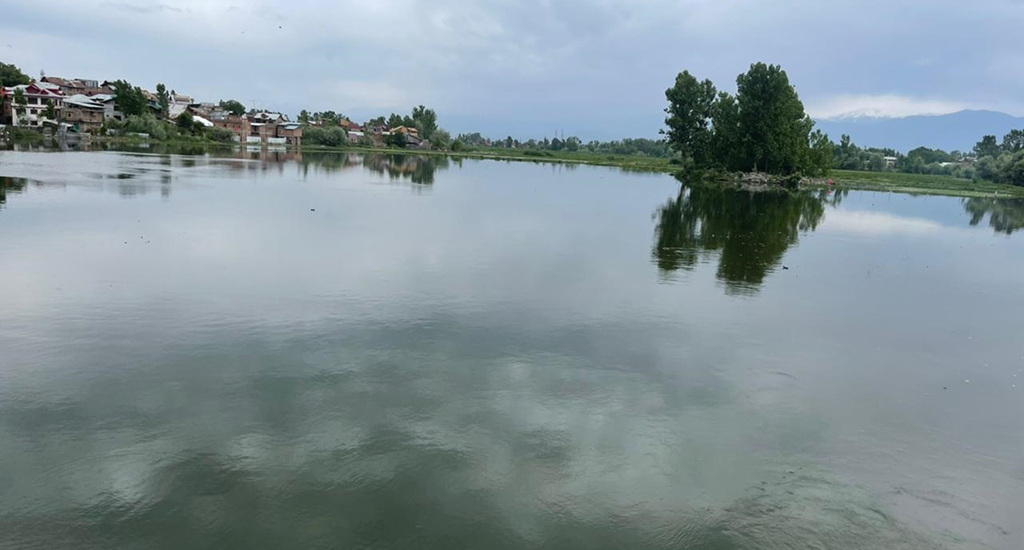
Srinagar’s Lake Khushal Sar springs back to life
Thanks to a team of nature-lovers, decades of garbage is cleared from Lake Khushal Sar, spurring on more restoration of Srinagar's famous lakes and buoying the revival of lake-based livelihoods.

Thanks to a team of nature-lovers, decades of garbage is cleared from Lake Khushal Sar, spurring on more restoration of Srinagar's famous lakes and buoying the revival of lake-based livelihoods.
A group of people unloaded bulging bags from their boats in Lake Khushal Sar in Srinagar, while an older man, flaunting a long grey beard, patted them on their backs.
Bags full of fish?
No.
The bags were full of plastic bottles, polythene grocery bags and other garbage fished out of the lake.
Sexagenarian Manzoor Ahmad Wangnoo, a prominent nature enthusiast, and his team of volunteers were cleaning one of the most polluted water bodies in the city of Srinagar. While Dal Lake is Srinagar’s most famous, there are other lakes, like Khushal Sar, Gilsar, Nigeen and Anchaar in the densely populated city – all in need of restoration.
Once the glory of the city, these lakes have literally turned into dustbins.
It was on the local Doordarshan TV show Halat-e-Hazirah (Urdu for “current affairs”) TV show that inspired the cleaning of Srinagar’s lakes.

While discussing the pathetic condition of the local water bodies, the TV anchor asked the panelists to suggest ways to restore the city’s lakes.
After a pause came the response of ‘ehsas’ – meaning a sense of responsibility – from panelist Manzoor Ahmad Wangnoo, who realised it was time he tapped into his own ehsas.
Right after the TV show, nature enthusiast Wangnoo and two of his cousins drove to Khushal Sar Lake.
Exponential urbanisation, encroachment and dumping of waste had turned the lake into a dustbin and cesspool.
“We had to take many factors into consideration for restoration,” Wangnoo told Village Square. “So we developed a multi-pronged strategy.”
At the onset of spring 2021, a group of 20 volunteers led by Wangnoo manually removed garbage from the lake for almost 100 days.

“Each day we filled scores of gunny bags with waste collected from the lake. From dead animals and polythene bags to human refuse, the lake was filled with every kind of waste,” said Mushtaq Ahmad, a volunteer who oversaw the disposal of the collected waste at a dumpyard on the outskirts of Srinagar.
The lake was also choked by unwanted floating plants that flood waters had brought from nearby Dal Lake in 2014.
“The plants could not be removed manually. But thanks to the J&K Lake Conservation and Management Authority and Srinagar Municipal Corporation who provided us with the machinery, we could pull them out,” said Wangnoo.
“The local people are the real stakeholders. We needed their support and cooperation. So we reached out to the community with our simple slogan of ‘ehsas’,” said Wangnoo.
First they drew them in by talking about the collective responsibility to care for “nature’s bliss.” Then they brought in the economic benefits of such care.

“We launched a mass awareness campaign in and around the catchment areas about the socioeconomic importance of the lake, especially for the locals.”
Once spread over 1.6 square kilometres, the Khushal Sar had shrunk to 0.6 square kilometres, partly due to encroachment.
While cleaning the lake, the team also decided to clear some of the encroaching tin sheds. This was met with some resistance.
But getting local authorities and existing neighbourhood committees involved, the volunteers succeeded in retrieving part of the lake.
The volunteers then formed a new committee of local residents to guard the lake.
“As the lake has been made navigable again, the movement of boats augurs well for the revival of tourism as well as the local economy,” said Bashir Ahmad, a professor teaching economics at the University of Kashmir. (ALSO READ: Restoration of ponds leads to revival of agriculture)
Traditionally, fishermen and people who collected lotus stems – nadru in local parlance – made a living from the lake as it is a prized aquatic vegetable used in the local cuisine. But it had become a little darker in colour as the lake has been choked by pollution for the last 30 years.

But now that the lake has been cleaned, there is an apparent change in the colour of nadru. The brighter colour is an indication of good quality. The restoration has filled the farmers and fishermen with hope of renewed trade.
“Earlier we used to step into waist deep muddy waters full of trash to collect aquatic plants for fodder. But now movement’s very easy,” said local resident Ghulam Hassan, while paddling a boat through the cleaner Khushal Sar.
Encouraged by the success of the Khushal Sar restoration, the administration is now cleaning other lakes, like Gilsar and Vicharnag.
According to Mohammad Aijaz Asad, the Deputy Development Commissioner of Srinagar these water bodies had been a rich belt of birds and aquatic life. There is hope that the biodiversity will return.
“We’re taking all possible measures to restore Srinagar’s water bodies to achieve visible impact on ground,” he told Village Square.
After making a splash with Khushal Sar’s successful restoration, Wangnoo and other nature enthusiasts are happy it is inspiring the clean-up of more lakes in the valley.
Nasir Yousufi is a Srinagar-based journalist.